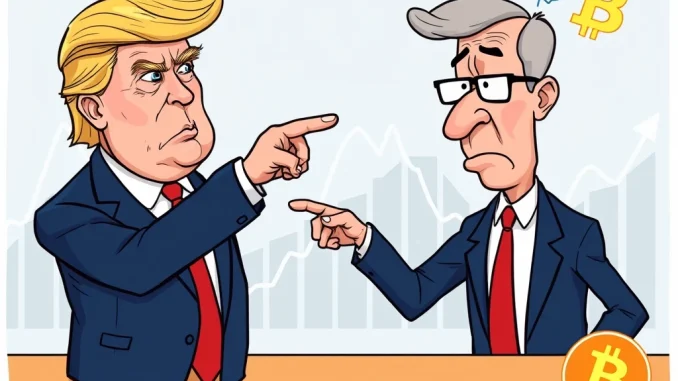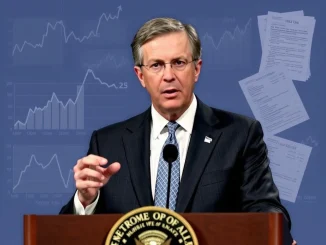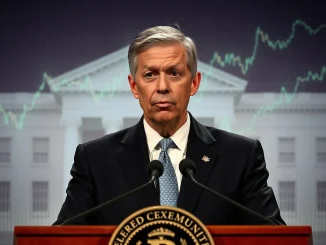
In a surprising jab that has financial markets buzzing, former U.S. President Donald Trump has once again taken aim at Federal Reserve Chairman Jerome Powell. According to a post by Walter Bloomberg on X, Trump bluntly stated that the “only thing [Fed Chair Jerome] Powell is good for is lowering rates.” This sharp criticism arrives amidst ongoing debates about the Fed’s monetary policy and its effectiveness in navigating the current economic landscape. For those in the cryptocurrency world, these pronouncements from influential figures like Trump can signal potential shifts in market sentiment and economic policy that could ripple through the digital asset space. Let’s dive deeper into what this statement means and its possible implications.
Donald Trump’s Scathing Remark on Jerome Powell
Donald Trump’s recent comment isn’t an isolated incident. Throughout his presidency, Trump frequently voiced his opinions on the Federal Reserve and its leadership, often pushing for lower interest rates to stimulate economic growth. This latest remark, characterizing Jerome Powell‘s competence as limited to just interest rate reductions, is a significant escalation in his public critique. It reflects a continued divergence in opinion between Trump and the current Fed regarding the appropriate course for monetary policy.
Here’s a quick recap of Trump’s statement:
- Source: Walter Bloomberg on X (formerly Twitter).
- Speaker: Former U.S. President Donald Trump.
- Target: Federal Reserve Chair Jerome Powell.
- Core Message: Powell’s effectiveness is limited to cutting interest rates.
This statement is particularly noteworthy as it comes at a time when the global economy is facing numerous challenges, including inflation concerns, supply chain disruptions, and geopolitical uncertainties. The Fed’s decisions on interest rates are crucial in managing these economic pressures, and public opinions from prominent figures like Trump can influence market perceptions and expectations.
Why Does Trump Focus on Interest Rates?
Trump’s consistent emphasis on lower interest rates stems from a belief that they are a primary driver of economic expansion. Lower rates make borrowing cheaper for businesses and consumers, theoretically encouraging investment and spending. This approach aligns with a broader economic philosophy that prioritizes growth stimulation, often through monetary easing.
Key reasons behind Trump’s preference for lower rates:
- Stimulating Economic Growth: Lower rates can boost borrowing and investment, fueling economic activity.
- Market Performance: Lower rates often correlate with positive stock market performance, a metric frequently highlighted during Trump’s presidency.
- Political Advantage: A strong economy is generally seen as beneficial for incumbent political parties.
However, this perspective is not without its critics. Many economists argue that excessively low interest rates can lead to:
- Inflation: Too much easy money can overheat the economy, leading to rising prices.
- Asset Bubbles: Low rates can inflate asset prices, creating unsustainable bubbles in markets like real estate and stocks.
- Reduced Savings Returns: Savers earn less on their deposits when rates are low.
The Federal Reserve’s Balancing Act
The Federal Reserve, under the leadership of Jerome Powell, operates with a dual mandate: to maintain price stability and maximize employment. This often requires a delicate balancing act, especially in times of economic uncertainty. The Fed’s decisions are data-driven and aim to steer the economy toward these objectives without succumbing to political pressures.
The Fed’s current stance involves:
- Data Dependency: Policy decisions are based on a wide range of economic indicators, including inflation, employment, and GDP growth.
- Inflation Targeting: The Fed aims to keep inflation around a 2% target.
- Forward Guidance: Communicating future policy intentions to manage market expectations.
Trump’s public criticisms add an extra layer of complexity to the Fed’s role. While the Federal Reserve is designed to be independent of political influence, such high-profile comments can create market volatility and public scrutiny. Powell and the Fed must navigate these external pressures while staying true to their mandate.
Impact on the Economy and Cryptocurrency
So, what does all of this mean for the broader economy and, more specifically, the cryptocurrency market? Trump’s statements, while opinions, carry weight due to his past presidency and continued influence within the political landscape. His remarks can influence market sentiment and potentially shape future policy discussions.
Potential economic impacts:
- Market Volatility: Strong opinions from influential figures can create short-term market fluctuations.
- Policy Debates: Trump’s comments fuel ongoing debates about the Fed’s independence and the optimal level of interest rates.
- Investor Sentiment: Such pronouncements can affect investor confidence and risk appetite.
For the cryptocurrency market, which often reacts to macroeconomic signals, these developments are also relevant:
- Inflation Hedge Narrative: If concerns about inflation rise due to perceived pressure on the Fed to lower rates, cryptocurrencies like Bitcoin might be seen as a more attractive hedge.
- Risk Asset Behavior: Cryptocurrencies are generally considered risk assets. Changes in interest rates and overall economic sentiment can significantly impact their price movements.
- Regulatory Landscape: Political discourse around economic policy can indirectly influence the regulatory environment for cryptocurrencies.
Navigating the Noise: What to Watch For
In the face of such pronouncements and market noise, what should investors and those interested in cryptocurrency be watching for?
- Fed Actions and Statements: Pay close attention to official communications from the Federal Reserve, including speeches, meeting minutes, and policy announcements.
- Economic Data: Keep an eye on key economic indicators such as inflation rates, employment figures, and GDP growth. These data points will drive the Fed’s decisions.
- Market Reactions: Observe how financial markets, including both traditional and cryptocurrency markets, react to statements from political and economic figures.
Conclusion: A Commentary with Market Implications
Donald Trump’s assertion about Jerome Powell and interest rates is more than just a fleeting comment. It’s a reflection of ongoing debates about monetary policy, the role of the Federal Reserve, and the best path forward for the U.S. economy. For those in the cryptocurrency space, understanding these macroeconomic undercurrents is crucial. While Trump’s words alone won’t dictate the future of finance, they contribute to the complex narrative that shapes market sentiment and policy discussions. Staying informed and critically analyzing these developments will be key to navigating the evolving financial landscape.



